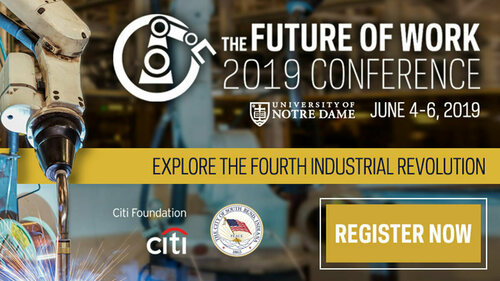
Politicians, pundits and experts on both U.S. coasts often weigh in on what the workforce will look like in the coming decades while many people fear their jobs will be replaced by robots. And, while one-quarter of American jobs are at a high risk of automation, according to a Brookings Institution report, the kinds of jobs that will be affected — mainly manufacturing and agricultural — are heavily concentrated in the Midwest. In fact, Indiana is home to two of the top three most at-risk cities in the nation, according to the report, with nearly 55 percent of jobs in Elkhart and Kokomo vulnerable to automation.
Organizations have yet to determine how and if the future of work will yield positive or negative outcomes for the global workforce. With the support of Citi Foundation and the city of South Bend, the University of Notre Dame is hoping to generate multi-stakeholder dialogue on this issue by hosting a two-day conference, “The Future of Work,” from June 4 to 6. The event is being organized by two global institutes within the University’s new Keough School of Global Affairs, the Notre Dame Initiative for Global Development and the McKenna Center for Human Development and Global Business.
“Most discussions around the future of work either over-promise the benefits of technology, ignoring the potential downsides, or they are apocalyptic in their predictions of threats to security, human health, well-being and job elimination,” said Ray Offenheiser, Keough School professor of the practice and seasoned policy executive. “This conference brings stakeholders together from different ends of the spectrum, to meet in the middle and listen to each other, so that we can learn to adapt with an eye for the future.”
The conference will convene thought leaders from the private sector, international NGOs, foundations, academia and local, state and federal governments to delve into topics such as smart cities and urban innovation. Importantly, the third day of the conference will focus on workers’ concerns and how skills training could keep them competitive.
The June 5 keynote address will be given by Gary Bolles, chair for the future of work at Singularity University — a Silicon Valley-based global learning and innovation community empowering individuals and organizations to accelerate technologies including the use of AI, robotics and digital biology. South Bend Mayor Pete Buttigieg will participate in a panel on urban innovation along with officials from other cities who will highlight issues and innovations in their respective cities.
“Conference attendees will tour South Bend and see how we're prioritizing inclusion in the midst of urban innovation,” said Denise Linn Riedl, South Bend’s chief innovation officer. “By embracing lifelong learning programs as well as creative partnerships with local employers and universities, we hope to support and empower all residents to thrive, even as the workplace changes around them.”
Tickets for this event are available online. Nonprofit organizations, government employees and college or university employees are eligible for a discount. The conference is open to media but the opening reception is for invited guests only. Registration is required via the Notre Dame Office of Media Relations: csharke2@nd.edu
Contact: Colleen Sharkey, assistant director of media relations, 574-631-9958, csharke2@nd.edu